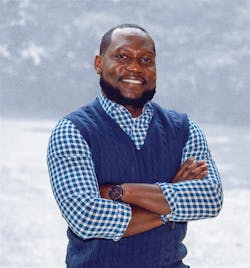Around age 2, Cawens Fleurilus spotted men working on broken-down cars on the streets of his native Haiti.
Peering out of gates, Fleurilus watched them take vehicles apart and somehow — magically, it seemed — put them back together and get them running again. He couldn’t yet pronounce the word “mechanic,” but he told his mother that he wanted to be a “be-chanic,” too.
“It was always my dream,” he says. “Looking back, that was the start of an amazing journey. I just hope my story now can inspire others.”
Today, Fleurilus, 34 and a United States citizen, is living his dream. After several years teaching at Atlantic Technical College (ATC) in Florida, where he once was a student himself, he recently began working as a training specialist at Southeast Toyota Distributors in Jacksonville, Fla.
There, Fleurilus develops and delivers advanced technical training to automotive professionals with Toyota, the brand of car he says is most desired by many Haitians. He travels to teach and visit the 12 dealers that he is responsible for in his district, which covers the southern part of Alabama and the Florida panhandle.
Fluent in English, French, and Haitian Creole, and with firsthand insights on how to overcome adversity with hard work, he has connected with a wide range of students and colleagues to help build diversity in the automotive industry.
For his blended expertise in diagnostics, hands-on repair work and instructional leadership, Fleurilus is the 2025 Motor Age Best Young Tech.
“As soon as we met Cawens, we knew that he was hungry, smart and determined,” says Ryan Walos, technical training specialist supervisor and coach at Southeast Toyota Distributors. “His life story alone showed us that, and he has proven to be all of those things — plus very reliable. He’s an inspiration.”
Fleurilus, the youngest of four children, grew up in Port-au-Prince, the capital of Haiti, and was raised by a single mother. His mom earned enough money as a businesswoman to support him, his three older sisters and a cousin who lived with them, largely by reselling shoes and some clothing that she picked up from markets in Florida and Panama.
Not poor compared to many other Haitians, Fleurilus’ family had safe housing and enough food to eat — but no car. He and his siblings took public transportation to school but sometimes had to walk if political instability or gun violence in the streets shut down buses and taxis.
“It was five or six miles, but all of us kids were in the same boat,” he notes. “We’d walk together and talk and laugh.”
Fleurilus’ father lived in Fort Lauderdale, Fla., where he made occasional visits until 2010. That year, on Jan. 12, a devastating 7.0 earthquake hit Haiti, killing an estimated 300,000 people and destroying homes, buildings and infrastructure throughout Port-au-Prince.
The high school where Fleurilus was due to study for one more year was among the heavily damaged structures. Had the earthquake struck about four hours earlier, he likely would have been buried in rubble in his classroom.
“I live a life of gratitude every day, just because I was there on that day and I am still alive,” he says. “So many others are not.”
At age 19, Fleurilus went to live with his dad, who does landscaping work, originally under a special temporary protected status due to the earthquake. He spoke no English, didn’t know how to drive and began his studies in America in an English for Speakers of Other Languages (ESOL) program with ATC adult education instructors.
By 2011, Fleurilus had gotten a driver’s license and mastered enough English to earn a GED. Once he had, he was ready to pursue his childhood dream to improve his life for himself and his family. He credits his mother with encouraging him to follow that passion, even if it didn’t match her original vision of having him be a doctor or lawyer.
Then 21 years old, Fleurilus enrolled in ATC’s Toyota T-TEN Advanced Automotive Program after meeting with a school guidance counselor, despite the fact that he understood virtually nothing about cars. While not all of his instructors were originally 100 percent sure he could handle the intense curriculum, none of them gave up on him.
“I didn’t know what coolant was,” he recalled. “I didn’t even know how to do an oil change. But that’s what school and good teachers are for. Not knowing about cars or doing repair work on them before shouldn’t stop anyone. You can still go really far.”
As part of ATC’s program, which he completed in 2014 while sometimes working two jobs for income, Fleurilus interned at Toyota of Deerfield Beach. Eventually, that placement was extended to full employment.
Soon promoted to line technician, Fleurilus worked his way up to become a Toyota Master ASE Technician in 2018. Over an eight-year period, he took on important leadership roles, began training new technicians, ensured team consistency, sought out and embraced new responsibilities and earned multiple Employee and Tech of the Month awards.
Ready to move to the next level, Fleurilus completed an associate degree of applied science in automotive technology supervision and management from Broward College while continuing to work full time. He's earned ASE certifications for automotive service (A1-A8), automobile advanced engine performance specialist (L1) and auto maintenance and light repair (G1).
In 2021, Fleurilus came full circle when he was invited to return to ATC as an automotive repair instructor under the Broward County School Board. He took a pay cut due to a deep desire to give back to the industry that had changed his life, and to help prepare the next generation of shop technicians. “It felt personal to me,” he said.
As a teacher, Fleurilus emphasized hands-on skills, emerging automotive trends and individualized instruction and mentorship. From that time on, he has bridged the gap between technical proficiency and educational excellence by succeeding at both.
The next year, in fact, ATC’s Graduation Committee asked him to serve as keynote speaker for the graduating class of 2022.
“His devotion to self-improvement demonstrates how hard work, dedication and commitment can transform an individual life into one that led him to helping others find their own way to success,” ATC staff shared in an article published in “Get There”, a newsletter on continuing and adult education programs in Florida. “His story should inspire anyone, no matter what their accomplishments are.”
That same year, on Aug. 19, 2022, Fleurilus became a U.S. citizen. “It was all proof to me that you can start as the underdog but achieve a lot,” he says. “You can become a leader and a mentor yourself.”
Transitioning into a new job at Southeast Toyota Distributors earlier this year, Fleurilus is now a leader at one of the country’s largest distributors of Toyota vehicles and parts. His job is to develop and deliver advanced technical training to automotive professionals in his district, ensuring they stay ahead of industry standards and innovations.
Colleagues describe him as punctual, attentive, and friendly — a people person who goes the extra mile with a smile on his face.
“Cawens has so much knowledge and a great ability to capture his audience and hold their interest,” Walos shares. “I know him as an instructor, and it’s fun watching him teach, because he’s entertaining and puts off a really good, positive energy.”
In Fleurilus’ eyes, integrity is at the heart of being a good technician. That means doing whatever it takes to get the job done. He typically works nine-hour days, from 7:30 a.m. to 4:30 p.m., but stays late if needed — understanding his limits and earning the trust of his customers.
“It’s OK if you don’t know something,” he says. “It’s OK to ask for help, study, read, learn, and feel a little uncomfortable, because that’s how you’ll get better. And we should do thorough inspections on every car and then work on each one like customers are always watching. You want to show you’re there to help rather than just trying to make money off them.”
As an instructor, Fleurilus has joined the effort to reduce the stubbornly high rate of technician turnover in shops, a major problem across the automotive industry. Having students learn in classrooms as well as under the guidance of a shop mentor is key, in his opinion.
“Studies have proven that the more trained a tech is, the more likely that tech will stay in the industry,” he says. “We want to make sure that they have a good support system in place in our shops while also providing technical education.”
Widening the potential pool of technician candidates is another strategy. There, Fleurilus believes that having people of many different backgrounds as instructors, shop leaders, and mentors will help.
“I think it’s important for the purpose of representation,” he says. “When you are inspired by someone like you, who has been exposed to the same cultural and social struggles, I believe that level of inspiration has a lot more impact.”
And diversity isn’t just about race or ethnicity; Fleurilus also has been happy to see more women taking jobs in automotive repair. “They are very deep thinkers,” he says. “Not to say males are not, but statistically, the female students perform extremely well on their tests.”
Social media, he continued, can be a powerful tool not just for advertising but for exposing viewers to the “cool” side of automotive repair and the high level of technical expertise required for many positions, particularly given the expansion of computerized systems and electric vehicles. “People usually have a stereotype about the industry like it is not really for smart people. We can help change that.”
In Fleurilus’ specific case, that has meant not only training fellow Haitians to become technicians but encouraging them to take pride in being part of the industry. In turn, he hopes that change in mindset will help the entire Haitian community understand its value.
Finally, Fleurilus anticipates that artificial intelligence could help ease some administrative burdens for technicians — as has been the case in other professions — by assisting with paperwork requirements and enhancing their writing skills, giving them more time and energy to concentrate on repair work and customer interactions.
“I think of AI as the same way of a calculator,” he explained. “If you know the process, it will help you get the results faster, but you have to use the right formula to get the right results.”
Outside work, Fleurilus last year accepted a volunteer appointment to the board of directors of Broward Community and Family Health Centers, which serves lower income residents. In that role, he influences strategic decisions, contributes industry insights and helps recruit other board members, all to strengthen the organization’s mission to support local families.
Fleurilus and his wife, a fellow Haitian who is a social worker by trade, also are busy raising a 6-year-old son and a 3-year-old daughter. (Both of his children already love toy cars and watching their dad work on vehicles, especially his little girl.) They spend most of their free time together. In addition, Fleurilus enjoys traveling and playing video games.
The family owns three Toyotas: an Avalon, a Highlander and a Solara. “Looking at my kids, the life they have is night and day compared to what I had when I was a child,” he says. His three sisters and mother now live in Boston. He adds: “We all have blessed lives.”
Fleurilus still misses his home country, including its traditional stews and rice and cornmeal porridge dishes with meat, seafood, creamy bean sauces, gravies and spices that draw from African, French, Spanish, and indigenous cultures. He has traveled back to Haiti with his wife and hopes to take his kids there one day if the trip feels safe.
Meanwhile, now miles away from his days of watching street “be-chanics” as a wide-eyed boy, Fleurilus only wants to keep moving up in his company and industry.
“I’m always looking to grow and to help others grow,” he says. “We have an outstanding culture at my work for which I am very thankful. I’ll never forget how fortunate I am.”


